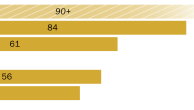The following list includes brief descriptions of some religious groups and other terms used in the survey report that may be unfamiliar to readers. Descriptions have been adapted from the website of the American Correctional Chaplains Association, Associated Press Stylebook, ReligionFacts.com, the Religion Newswriters Association’s Religion Stylebook and ReligiousTolerance.org.
American Correctional Chaplains Association A professional association founded in 1885, the ACCA’s goals include providing a network for sharing information among chaplains, formulating standards for chaplaincy and religious programs, and communicating the religious and spiritual aspects of corrections to the larger community.
Asatru An Icelandic term for “faith in the gods,” Asatru is a modern attempt to recreate the polytheistic, pre-Christian faith of the Nordic/Germanic people. Like Odinism, it is often associated in prisons with Aryanism and other white supremacist theories.
Hebrew Israelites Members of this group, also known as Black Hebrew Israelites and Black Hebrews, believe themselves to be descendants of the ancient Israelites, although their theology is historically rooted in a Christian understanding of the Old Testament. There are several denominations within this umbrella group, including the Church of God and Saints of Christ, Church of the Living God and African Hebrew Israelite Nation of Jerusalem.
Christian Identity Movement A movement that asserts that white Europeans or Caucasians are God’s chosen people. Theologically, it holds to a belief known as “Anglo-Israelism” – that the Anglo-Saxon, Celtic, Scandinavian, Germanic and associated cultures are the true descendants of the ancient tribes of Israel.
Moorish Science Temple of America An American offshoot of Islam founded by Noble Drew Ali in 1913, Moorish Science draws on elements of Buddhism, Christianity, Freemasonry, Gnosticism and Taoism and is often distinguished from traditional Islam.
Nation of Islam A movement founded by Wallace Fard Muhammad in 1930 based on principles of Islam and black pride. It was led for more than 40 years by his disciple Elijah Muhammad, who taught that black Americans were descended from the ancient tribe of Shabazz. Its current leader is Louis Farrakhan.
Odinism Like Asatru, Odinism is an attempt to recreate the indigenous, pre-Christian religion of Northern Europe. It is named for Odin, a major god in Norse mythology, also known as Wotan or Woden. The modern practice of Odinism is often associated in prisons with white supremacist theories.
Pagan and earth-based religions These spiritual movements seek to revive reverence for nature and to emulate the polytheistic beliefs and rituals of pre-Christian religions in Europe (particularly Norse and Celtic traditions) or the Middle East (particularly ancient Egypt). Such religions include Asatru, Druidism, Odinism, Thelema and Wicca. They are sometimes called neo-pagan religions.
Prison chaplains These correctional employees often are ordained clergy but include lay people with religious and pastoral training. Although they usually represent a particular denomination or religious tradition, they are charged with helping to meet the religious and spiritual needs of inmates of all faiths. Their duties may include providing pastoral care to inmates, inmates’ families and prison staff as well as organizing religious programs for inmates, training and supervising volunteers, advising correctional officials on religion-related policies and various administrative functions.
Rastafarian The Rastafari movement is a “messianic religio-political movement” that began in the Jamaican slums in the 1920s and ’30s. The movement has no formal organization, but some common threads include belief in Ethiopian Emperor Haile Selassie I as a divinity, the influence of Jamaican culture and pride in African heritage.
Rehabilitation programs These prison-based programs are intended to help inmates become law abiding citizens by providing services such as substance abuse treatment, vocational training, education, counseling, victim-offender mediation, faith-based support groups and prison contemplative programs (such as meditation and yoga).
Recidivism A former inmate’s relapse into criminal or delinquent behavior, recidivism is measured by the rate at which former inmates return to prison.
Re-entry An inmate’s transition from prison back to the community is known as re-entry. Many prisons offer programs to aid inmates in this transition. The programs typically begin with pre-release services such as counseling, mentoring, parenting advice and religious programs, but they may also include services delivered after release from prison through parole offices, community organizations and transition centers.
Religious accommodation This term refers to efforts to ensure the constitutional rights of inmates to practice their religion while in prison. Accommodations may include making available religious services, leaders, diets, books and other resources, as well as allowing for observance of religious holidays and customs.
Religious diet While in prison, accommodations are often made for inmates to receive special meals that conform to the laws and regulations of different faith traditions, such as kosher diets for Jewish inmates, halal diets for Muslim inmates, and vegetarian or vegan diets for Seventh-day Adventists.
Religious service coordinators Some states employ religious service coordinators in addition to, or instead of, chaplains. They perform many of the same functions, including organizing religious programs and supervising religious volunteers. Unlike chaplains, however, religious service coordinators typically do not provide pastoral counseling or lead worship services themselves.
Religious rights of prisoners The First Amendment of the U.S. Constitution guarantees all Americans the right to free exercise of religion. Congress has passed two laws to help ensure that inmates’ religious rights are reasonably protected without threatening the security of the prison: the Religious Freedom Restoration Act of 1993 (RFRA) and the Religious Land Use and Institutionalized Persons Act of 2000 (RLUIPA). (For more on RFRA and RLUIPA, see the Pew Forum’s 2007 legal report, “A Delicate Balance: The Free Exercise Clause and the Supreme Court.”)
Salafism Salafism is a puritanical movement in Islam that emphasizes a conservative and literalist interpretation of scriptural sources. Literally followers of the salaf as-salih, or “pious predecessors,” Salafis emphasize exclusive reliance on the teachings of the early Muslims closest to the Prophet Muhammad.
Santeria Known by several other names, includingLukumi,Santeria began as a combination of Catholic traditions and traditional West African folk rituals practiced in the Caribbean.
Satanism The term Satanism has many possible meanings. However, some experts distinguish between two main types of modern Satanists: theistic Satanists, who worship the devil as a deity, and atheistic Satanists, who do not worship or even believe in the Christian notion of the devil but rather embrace Satan as a symbol of individualism, self-indulgence and vengeance (or “eye-for-an-eye” morality). The best-known atheistic Satanist organization is the Church of Satan, founded by the musician and writer Anton LaVey in 1966.
Wicca There are many forms of Wicca, but they generally involve the worship of a divine feminine, or goddess, and a reverence for nature and its cycles, marked by seasonal festivals called Sabbats. Wicca is traditionally believed to be based on the symbols, celebrations, beliefs and deities of ancient Celtic peoples. Many Wiccans practice witchcraft, but they typically do not engage in devil worship or Satanism.
Photo Credit: © Illustration Works/Corbis




